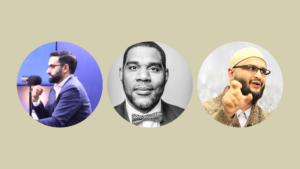Join us for an exciting author evening with Imam Dawud Walid and guest speaker, Shaykh Thaqib Mahmood, to discuss Futuwwah and Raising Males into Sacred Manhood. This event will be chaired by Muhammad Jalal.
Order your copy of Futuwwah from the IHRC Bookshop.
WHEN: Friday, 28 April, 2023, 6.30pm BST
TICKETS:
- Book venue or online admission here (if you have booked an online ticket, the link will be sent an hour before the event begins)
- Book student admission here (15 years and under attend for free)
WHERE: Kamran Djam Lecture Theatre (DLT) (SOAS University of London, 10 Thornhaugh Street, Russell Square, London, WC1H 0XG)
About the book:
Futuwwah and Raising Males into Sacred Manhood concisely discusses the principles within futuwwah, or spiritual chivalry, that young men should strive to embody and should inculcate into our communities. While the virtues discusses in this text are not all exclusively related to young males becoming men, this book is tailored towards males, and the specific issues faced by males as they strive to grow into the path of manhood. Just as young women need their own spaces to learn from women how to become honorable sisters, young men require their own special places to instill in them the virtues of upright brothers.
The Islamic tradition calls for a revival of organized training relating to spiritual chivalry and sacred manhood – this is the task of the hour. There are beautiful and majestic qualities embodied by the Prophets that he passed down to his family members and pious Companions. Those upright men were methodically raised up: they undertook rites of passage, and manly responsibilities which were placed upon them with expectations that they would be executed with excellence.
This book begins by establishing the linguistic and operational definition of the Arabic ‘futuwwah’ translated here as “spiritual chivalry.” The text then discusses the essential virtues for developing healthy manhood, in a specific order of their priority in teaching. The Qur’anic verses, Prophetic narrations, and sayings of pious Companions and scholars on the subject of futuwwah are related with sound meaning, accompanied by meticulous citations in footnotes and endnotes.

About the speakers:
Imam Dawud Walid is currently the Executive Director of the Michigan chapter of the Council on American-Islamic Relations (CAIR-MI), member of the Imams Council of Michigan, and a Senior Fellow at Auburn Seminary based in New York.
Walid has studied under qualified scholars the disciplines of Arabic grammar and morphology, foundations of Islamic jurisprudence, comparative Islamic jurisprudence, and sciences of the exegesis of the Qur’an.
He previously served as an imam at Masjid Wali Muhammad in Detroit and the Bosnian American Islamic Center in Hamtramck, Michigan, and board president of Al-Ikhlas Training Academy.
He is the author of the books Towards Sacred Activism, Blackness and Islam, and Futuwwah and Raising Males into Sacred Manhood, and co-author of the books Centering Black Narrative: Black Muslim Nobles Among the Early Pious Muslims and Centering Black Narrative: Ahl al-Bayt, Blackness & Africa as well as author of essays in the 2012 book All-American: 45 American Men on Being Muslim and the 2014 book Qur’an in Conversation and author of the foreword to the book The Spirits of Black Folk: Sages Through the Ages.
Shaykh Thaqib Mahmood is a traditionally-trained Muslim scholar and instructor in Arabic. He has studied the traditional Islamic disciplines in Yemen, Syria, the UK, Mauritania, and Turkey. He currently teaches Arabic at the Faculty of Theology and Religion at the University of Oxford. He holds a PGDIP in Arabic teaching from the School of Oriental and African Studies, and has completed a Master’s degree in linguistics at the same institution.
He is also a gifted grappler and holds a black belt in Brazilian Jiu-jitsu.
Muhammad Jalal is a lecturer in Politics and host of The Thinking Muslim podcast. He delivers a regular course for young Muslims exploring the thoughts of Islam and Liberalism, and is currently working on developing content on the same subject for the Sapience Institute. He writes for numerous online journals including Traversing Tradition, Muslim Matters and CAGE.








